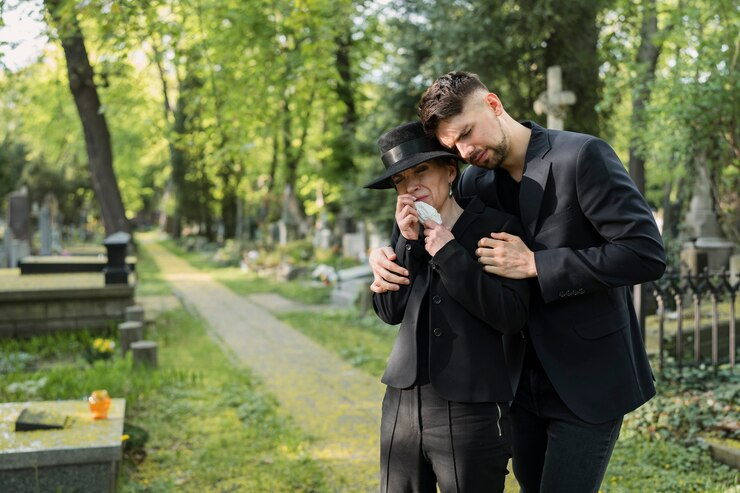Have you ever found yourself wondering what the right way to pay last respects is? In moments of grief, knowing how to act can be confusing, yet deeply important.
Funerals are more than just ceremonies; they’re opportunities to honour a life lived and provide comfort to those left behind. But how do you handle the nuances of modern funeral etiquette in a world that’s constantly changing?
The Evolution of Funeral Etiquette
Funeral customs have evolved significantly over time, reflecting changes in culture, society, and personal beliefs. What was once a strictly formal event has become more personalized and varied, allowing families to create ceremonies that truly reflect the life of the deceased. However, despite these changes, certain aspects of funeral etiquette remain timeless.
Traditionally, funerals were solemn affairs where attendees dressed in black remained quiet and followed a strict set of rules. Today, while respect and reverence are still key, the approach can vary widely. Some funerals are celebratory, focusing on the joy of the person’s life rather than the sadness of their passing. Others may be casual, encouraging attendees to dress in bright colours or to share personal stories.
Regardless of the style, the underlying purpose remains the same: to honour the deceased and support their loved ones. Understanding the evolution of funeral etiquette helps us appreciate the flexibility in modern customs while ensuring we still uphold the essential values of respect and compassion.
Understanding the Importance of Paying Last Respect
Paying last respects is a powerful gesture that transcends cultural and religious boundaries. It’s an opportunity to acknowledge the life that was lived and to show solidarity with the bereaved. For many, attending a funeral or memorial service is a way to express their grief, share memories, and find closure.
Paying last respects can take many forms. It might involve attending a service, sending a sympathy card, offering kind words, or participating in rituals that hold special meaning to the family. Each gesture, no matter how small, contributes to the healing process for those who are grieving.
Moreover, paying last respects is not just about the deceased—it’s also about supporting the living. Funerals bring people together, creating a community of care and comfort around those who are mourning. By participating, you’re helping to lift the burden of grief, even if only for a moment.
The Role of Not-for-Profit Funeral Homes
When it comes to planning a funeral, many families turn to not-for-profit funeral homes for their services. These organizations are dedicated to serving the community, often providing more affordable options and a compassionate approach that prioritizes the needs of the family over profit.
Not-for-profit funeral homes often focus on creating meaningful, personalized services that reflect the values and wishes of the deceased and their loved ones. Because they are not driven by profit, these funeral homes can offer more flexible options, including eco-friendly burials, community memorials, and sliding scale pricing for those in financial need.
Choosing a not-for-profit funeral home can be a significant decision for families who want to ensure that their loved one’s funeral is handled with care and integrity. These organizations often go above and beyond to provide a supportive environment, helping families navigate the complexities of funeral planning during a difficult time.
Key Elements of Modern Funeral Etiquette
As funerals have evolved, so too has the etiquette surrounding them. Here are some key elements to keep in mind when attending a modern funeral:
1. Dress Appropriately
Dressing appropriately for a funeral is a sign of respect. While black is still the traditional colour of mourning, many families now encourage attendees to wear colours that reflect the personality of the deceased. If you’re unsure, it’s always better to err on the side of formality. Avoid wearing anything too casual or attention-grabbing.
2. Arrive on Time
Punctuality is crucial when attending a funeral. Arriving late can be disruptive and may be seen as disrespectful. Aim to arrive at least 10-15 minutes before the service begins. If you do arrive late, enter quietly and find a seat near the back to avoid disturbing the ceremony.
3. Offer Condolences Thoughtfully
Offering your condolences to the family is one of the most important aspects of funeral etiquette. A simple, heartfelt expression of sympathy can mean a lot to those who are grieving. Avoid saying anything that could be interpreted as minimizing their loss, such as “They’re in a better place” or “At least they lived a long life.” Instead, focus on offering support and understanding.
4. Respect Cultural and Religious Practices
Funerals often include cultural or religious practices that may be unfamiliar to you. It’s important to respect these traditions, even if they differ from your own beliefs. If you’re unsure about what to do, observe others and follow their lead. It’s also okay to ask the family or the officiant for guidance if you’re uncertain.
5. Participate When Appropriate
If the funeral service includes opportunities for participation, such as singing hymns, reciting prayers, or sharing memories, it’s respectful to join in if you feel comfortable. Participation can be a way to show your support and contribute to the collective mourning process. However, if you’re uncomfortable with certain aspects of the service, it’s okay to remain silent.
6. Respect the Family’s Wishes
Every funeral is unique, and the family may have specific wishes regarding the service. Whether it’s a request for privacy, a dress code, or a particular way to honor the deceased, it’s important to respect these wishes. If the family has asked for donations to a specific charity in lieu of flowers, for example, consider honoring that request.
Paying last respects is a fundamental part of the grieving process, both for those who have lost a loved one and for those who want to offer their support. Whether you’re attending a service hosted by a traditional funeral home or a not-for-profit funeral home, your presence and actions can make a significant difference to those who are mourning.
